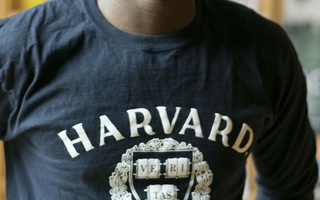"All we really have left that requires students to speak is the three speeches at commencement," Gomes says.
The result is a decline in the quality of speaking at Harvard and also throughout the nation.
"It's a great shame that we have no rhetoric requirement, for we are afflicted with nonsense all the time," says Gomes. "Rhetoric helps determine the difference between spin and substance and rhetorical truth from nonsense."
Hood, one of the Boylston contestants, faults the examples set by prominent public figures.
"There's nothing left of quick wit," Hood says. "There is eloquence lacking in public life. Just look at the presidential debates, for example."
And to Engell, the founder of the only rhetoric course at Harvard, the increasingly media-driven society has made rhetoric substantially more important in the past decades--a development that has not been reflected in Harvard's course requirements.
"There was a time when we thought we were going into a print culture in the late 19th and 20th century, but we are now ironically in an age of TV and electronic communication," Engell says.
Read more in News
HBS Profs Say Bush's 'CEO in Chief' Title MisleadingRecommended Articles
-
Junior Nabs Boylston PrizeAfter reciting a stirring passage from a Zora Neale Hurston novel, Joyce I. Imahiyerobo '01 was awarded the first-place Boylston
-
Students Awarded Boylston PrizeAfter an intense night of English and Latin rhetoric, Brian E. Gatten '01 and Andrew Amo '01 emerged victorious in
-
TWO RECEIVE FIRST AWARDS FOR SPEAKINGIn Sparsely filled Emerson D last night a Freshman and a senior, Michael D. Dawson '46 of Winthrop House, and
-
Historic Boylston Oratory Contest Starts in MarchCompetition for the College's traditional Boylston Prize for public speaking gets under way in March, the English Department announced yesterday.
-
 An Articulate Art: Spoken Rhetoric in the Contemporary University
An Articulate Art: Spoken Rhetoric in the Contemporary University













